
Contents
Published by Tuttle Publishing, an imprint of Periplus Editions (HK) Ltd. www.tuttlepublishing.com 2013 by Periplus Editions (HK) Ltd All rights reserved. ISBN: 978-1-4629-1353-4 (ebook) Distributed by: North America, Latin America and Europe
Tuttle Publishing
364 Innovation Drive, North Clarendon, VT 05759-9436 USA.
Tel: 1(802) 773-8930 Fax: 1(802) 773-6993
Asia Pacific
Berkeley Books Pte. Ltd.
61 Tai Seng Avenue #02-12, Singapore 534167
Tel: (65) 6280-1330 Fax: (65) 6280-6290
15 14 13 5 4 3 2 1 1305EP Printed in Hong Kong TUTTLE PUBLISHING is a registered trademark of Tuttle Publishing, a division of Periplus Editions (HK) Ltd.

Introduction This Mini Dictionary is an indispensable companion for visitors to Japan and for anyone in the early stages of learning Japanese. It contains all the 7,500 or so Japanese words that are most commonly encountered in colloquial, everyday speech.
For the sake of clarity, only the common Japanese equivalents for each English word have been given. When an English word has more than one possible meaning, with different Japanese equivalents, each meaning is listed separately, with a clear explanatory gloss. The layout is clear and accessible, with none of the abbreviations and dense nests of entries typical of many small dictionaries. The language of this dictionary is that spoken universally throughout the islands of Japan, by some 120 million people. Japanese is not clearly related to any other languages of the world. There was no written form of Japanese until the early centuries CE, when the system that had long been in use in China was borrowed and adapted.
Written Chinese does not relate directly to the sounds of the language; instead it makes use of a very large number of characters representing different syllables, to each of which is linked both a meaning and a sound. The characters derived initially from the stylized representation of concrete objects, to which the abstract meanings needed for the expression of the complete language were added by processes of combination and metaphor. The pronunciation of each of these characters is not obvious from the written form but must be learnt separately in each case. To make matters more complex, in Japanese each character (kanji) is usually associated with several possible pronunciations. One or more (the on readings) are derived from the Chinese syllable originally represented by the character, and others (the kun readings) from native Japanese elements of equivalent or associated meaning. Each reading is used in different contexts (for example when used alone or in compound words, as part of the general vocabulary or in proper names) and the choice is only partly predictable.
The Chinese language does not make use of inflections (changes to the form of a word to indicate grammatical information such as tense or number), so it can be effectively written in characters representing unvarying syllables. By contrast Japanese has many inflections, and the variable word endings and particles need to be represented in writing to prevent ambiguity. To this end a set of syllabic symbols (kana borrowed names), derived from Chinese characters but with only sound values and no meaning component, are used in conjunction with kanji. Thus in written Japanese the roots of words are represented by kanji, with the inflections and particles being in hiragana (rounded kana), derived from simplified cursive forms of certain kanji. Small versions of hiragana, known as furigana (applied kana), are also sometimes written above kanji to show their readings, for example in material for children or foreigners, or in case of ambiguity or some obscure characters used in personal names. A second version of the same set of syllables, with more angular forms and known as katakana (side kana, being derived from a part only of certain kanji) is also used for purposes such as transcribing foreign words and names, for representations of natural sounds, and sometimes for emphasis.
In this dictionary every Japanese word and phrase is also clearly spelled out in the Roman alphabet (romaji). In contrast with the complexity of the writing system, the pronunciation of Japanese is quite straightforward for English speakers: it is not a tonal language and syllables are evenly stressed. Distinguishing clearly between long and short vowels is important, as in several cases a completely different meaning can result. Long vowels are pronounced with twice the length of short vowels, effectively creating an extra syllable. In this dictionary they are indicated by a bar over the vowel concerned; elsewhere you may find them written with a double vowel, or with long e represented as ei and long o as ou , but these practices can be misleading to English speakers.
B
b N (serving drinks) bar baai N situation, occasion, case, circumstance bbeky N barbecue baffar N buffalo bgen N (reduced prices) sale bai N (multiplying) times; double baibai N buying and selling Baiburu N Bible baikin N germ baiku N motorbike baind N binder baio tekunoroj N biotechnology baiorin N violin baipasu N bypass bairingaru N bilingual bairitsu N magnification , magnifying power baishunfu N prostitute; whore baiten N (of vendor) stall, booth , kiosk bajji N badge baka N fool, idiot bakabakashii, bakarashii ADJ , absurd, foolish bakemono N monster , ghost baketsu N bucket bakkin N fine , (punishment) penalty bakku, baggu N , bag bakkuappu N backup , support bakuchi N gambling bakudai na ADJ immense , vast , enormous bakudan N bomb bakuhatsu suru V to blow, to burst, to explode bakuzen to ADV vaguely , obscurely bamen N scene ban N evening, night ban N (ones) turn; lookout -ban (counts numbers or orders) ; -banme [ NUMERAL ] +th banana N banana banchi N (house number) address bando N strap , (watch) band, belt ; (music) band bang N (assigned) number bangohan N (dinner/supper) evening meal bangumi N (broadcast) show, program banken N watchdog bankoku-hakurankai, banpaku N , international exposition banira N vanilla ban nin N watchman ban n N versatility , ability to do anything bans N musical accompaniment bansk N adhesive plaster/tape bara N (flower) rose barabara ni naru V to scatter ; in pieces baransu N balance: baransu o toru V to redress the balance basho N place bassuru V to punish basu N bus basugaido N bus tour guide basuketto N basket basukettobru N basketball basurbu N bathrobe basurmu N bath , bathroom basutei N bus stop bat N butter baton tatchi N passing the torch , having someone take over batsu, batten N , cross = X (means wrong) , a black mark batsu, bachi N retribution, punishment batsu no warui ADJ embarrassed, embarrassing batta N grasshopper batt N (baseball) batter battari ADV unexpectedly batto N (baseball) bat beb shitt N babysitter beddo N bed bekkan N (building) annex ben N feces bengoshi N lawyer benjo N toilet, lavatory benki N bedpan, toilet bowl, lavatory pan benky N study benkyzukue N desk benpi N constipation benri na ADJ handy, convenient bensh N compensation bent N box lunch beruto N belt bess N villa , vacation house bsu N base , basis; (baseball) base; bsu(git) () bass guitar bsubru N baseball besuto N () (clothes) vest besuto o tsukusu V to do ones best besutoser N bestseller Betonamu N Vietnam Betonamu(-jin) no ADJ () Vietnamese betsu no PRON, ADJ (different) another; other; extra betsubetsu (na/no) ADJ (/) separate , individual betsurykin N (charge) extra bchi N beach bideo dekki N VCR, video recorder bijin N beautiful woman, a beauty bijinesu N business bijinesu hoteru N economy hotel bijinesuman N businessperson bijutsu N art bijutsukan N art museum, art gallery bikkuri suru V to get startled, to get a surprise bimy na ADJ delicate , subtle , fine , nice bin N bottle binb na ADJ poor (needy) bin ru-bukuro N plastic bag binkan na ADJ sensitive bira N leaflet , handbill , pamphlet biri no ADJ the last , the tail end , the rear binsen N (letter-) writing paper binsoku ni ADV quickly bru N beer biru(dingu) N () building Biruma N (Myanmar ) Burma Biruma(-jin) no ADJ () Burmese bisshori ADV completely soaked: ase bisshori be all sweaty bisuketto N biscuit bitaminzai N vitamin pills biyin N beauty parlor biza N visa b N stick, pole bochi N cemetery , graveyard beki N trade, exchange beki-shsha/-gaisha N / trader, trading company benky N telescope bgai N disturbance bgyo suru V to defend bhanberu N burglar alarm bi N waiter bifurendo N boyfriend boin N vowel (sound) bken N adventure boki N bookkeeping bokoku N mother country , homeland bokuj N ranch bokushi N ( Christian ) minister , preacher , priest bokushingu N boxing bon N tray bnasu N (wage) bonus bnenkai N year-end party bonsai N bonsai , dwarf trees (in pots) borantia N volunteer bringu N bowling bru N ball brugami N cardboard brupen N ballpoint pen boruto N (nut and bolt) bolt; (electricity) volt bryoku N (brute force) violence borymu N volume bshi N () hat bosh suru V to recruit, to collect botan N button bto N boat bu N department, part, division, section -bu SUFFIX (counts books or bound things) copy bubun N part , portion buch N department/division/section head, manager bud N grapes bud N martial arts bugaisha N outsider buhin N ( machine ) part buji (ni) N (ADV) () (without incident) safe(ly) bujoku N insult buka N a subordinate buki N arm, weapon bukimi na ADJ ghastly , eerie bukiy na ADJ clumsy bukka N commodity prices bukkirab na ADJ blunt , brusque , curt Bukky N Buddhism Bukkyto N Buddhist bumon N sector, branch, department, section bun N part, portion, share; state, status bun, bunsh N , sentence, text bunbgu N stationery bungaku N literature bunka N culture bunkatsu N division, split-up bunken N literary document bunko(-bon) N () pocketbook bunmei N civilization bunp N grammar bunrui N classification bunseki suru V to analyze bunts suru V (write letters) to correspond buraj N bra burand N brandy burando N brand burasagaru V to hang (down) burasageru V to hang (down) , to suspend burashi N brush burausu N blouse burauza N (computer) browser burei na ADJ impolite, rude burk N circuit breaker (box) burki N brake burfu N () briefs burfuksu N briefcase buriki N tin burdobando N broadband burogu N blog , weblog busah na ADJ rude , blunt bushi N Japanese warrior , samurai busho N (in the office) department busshitsu N matter , substance buta N pig butai N stage butai N detachment of troops, unit, outfit butaniku N pork butsukaru V to collide with , to run into butsukeru V to hit butsuri(gaku) N () physics buttai N object, thing buzoku N tribe by N (of time) second -by SUFFIX (counts seconds) byd na ADJ equal byin N hospital byki N disease, illness byki no ADJ ill, sick bynin N an invalid , a patient bysha suru V to describe
Next page
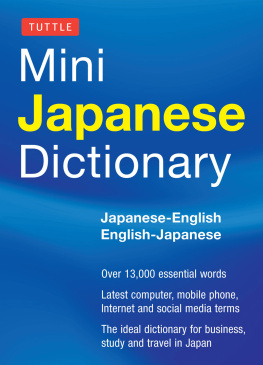
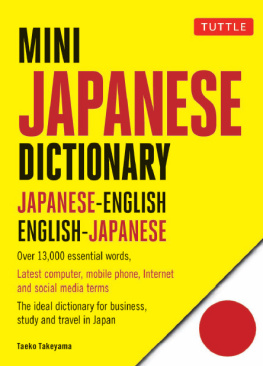

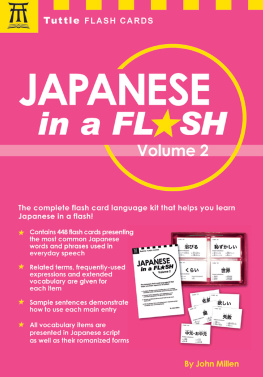

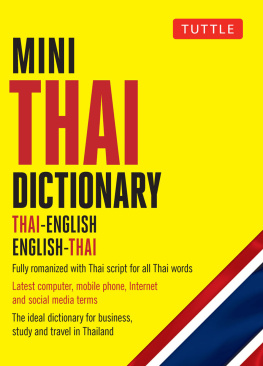




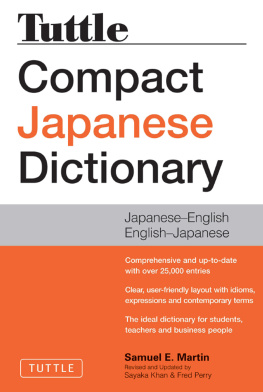
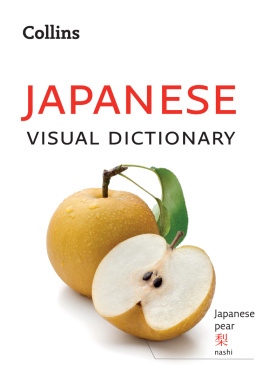


 Introduction This Mini Dictionary is an indispensable companion for visitors to Japan and for anyone in the early stages of learning Japanese. It contains all the 7,500 or so Japanese words that are most commonly encountered in colloquial, everyday speech.
Introduction This Mini Dictionary is an indispensable companion for visitors to Japan and for anyone in the early stages of learning Japanese. It contains all the 7,500 or so Japanese words that are most commonly encountered in colloquial, everyday speech.